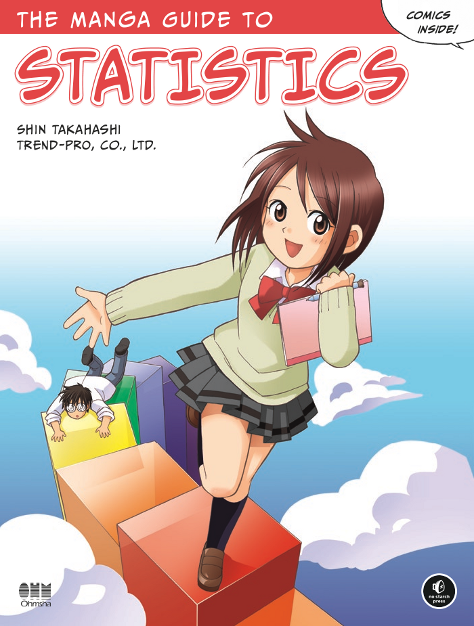But as I looked further there was one more book that caught my eye: an educational manga called Kanji de Manga Special Edition: Yojijukugo. When it comes to kanji, I need as much help as I can get, so I picked it up and after giving it a good look, I thought it was worth sharing.
I'm familiar with the concept of educational manga. I think with clever writing and artwork, a manga can be an engaging educational aid, but when done wrong it runs into the edutainment game problem of trying to jazz up a topic players don't really care about. The only previous experience I have with them is with The Manga Guide to Statistics my mom got me while I was taking a statistics class. It wasn't all that useful by that point, since the course was more than halfway over, but for the subjects that were left it explained a few things to my visual learning mind better than the class's textbook did.
Kanji de Manga is a series of books about Japanese kanji published by Manga University, a company that focuses around educational books of its type, spearheaded by former journalist Glenn Kardy, who has lived in Japan for quite a while.
Other Manga University books outside of the Kanji De Manga series include Manga Moods, Moe USA, how-to-draw books and Samurai Confidential, the latter of which is a Japanese history manga.
As if I need that.
I haven't read any of the other Kanji de manga books, but based on what I've read they're more useful as supplementary material for learning Japanese than books that will teach you alone. That holds true for the yojijukugo book.
Instead of being about individual kanji, this book centers around the titular yojijukugo, Japanese idioms made up of four kanji. There are 80 yojijukugo in the book, each with its own page and a good formula for detailing them.
From top to bottom, the pages go like this:
The closest English equivalent to the idiom.
The kanji that makes it up (with the hiragana for it underneath).
Artwork depicting what it means.
A text box describing what kind of context the idiom would be used in and breaking down the meaning behind each of the kanji that make it up, including notes on how the kanji form different meanings when combined with the other kanji and how they can be translated differently. Admittedly, some of the text referencing the artwork can be kind of cheesy.
Finally at the very bottom is an example sentence using the idiom, first in short form Japanese (mercifully all in hiragana & katakana except for the idiom itself) and then an English translation.
 |
| Chihiro Hattori's simplistic artwork gets the job done nicely. |
As you can probably tell, this book will only be useful for readers who are already on the ball. There's a translation index for the hiragana and katakana characters in the back, but you should know Japanese sentence structure and at least basic vocabulary in order to understand how the idioms should be used. That's not even bringing up how to write the kanji itself, but that's something for the other books to cover.
As I stated before, it's not exactly a lesson like you would find in a Japanese class's textbook. It's more of a reference guide (it's even about the size of a handbook), but for those studying or practicing Japanese it's a neat little book to have. It's practical, straightforward and informative.
For those who are interested, Kanji de Manga Special Edition: Yoijukugo (as well as many of Manga University's products) can be bought on both Amazon and Manga University's official website in both print and for Kindles. I've read complaints that the Kindle version's text is far too small to read unless you have the biggest model and it can't be enlarged, so you may want to stick to the print version. I can think of worse ways to spend $10.


No comments:
Post a Comment